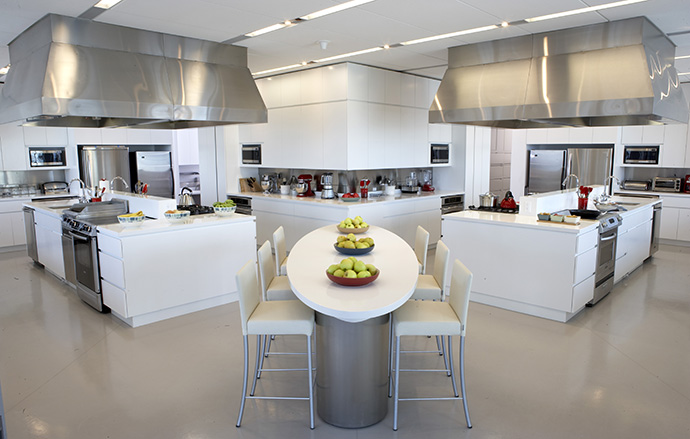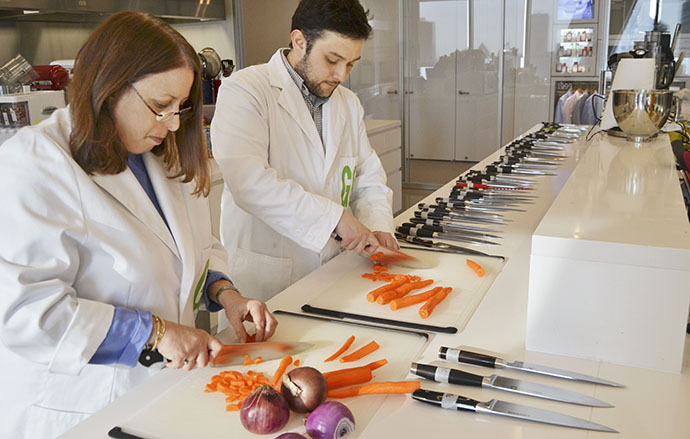
The 2015 JBF Food Conference will explore the future of food, from farm to kitchen to table. Featuring experts and thought leaders from across the industry, we'll examine how the choices we make and the steps we take today will impact what we eat, drink, and grow. In anticipation, we're talking to some of the men and women on the cutting edge of our collective food culture.
When considering the future of food, it’s hard to avoid fanciful prognostication about how our kitchens will change in tandem. Thankfully, we have the experts at Good Housekeeping to ground our dreams of robot cooks and pill-based meals in experience and science. Sharon Franke, director of the kitchen appliances and technology lab at the Good Housekeeping Institute, shares her vision for the kitchen of 2050, including thinking ovens, 3-D printing, and more.
--
JBF: Imagine the kitchen of 2050. What specific appliances do you predict home cooks will be using?
Sharon Franke: I think more kitchens will have induction burners and slow cookers that work more precisely to give perfect results. For example, beef stew would be prepared at an ideal simmering temperature so it would come out perfectly tender and never tough, dry, or stringy. With sous vide appliances, steaks can be cooked to an exact temperature all the way through and can be cooked for longer periods of time without the risk of overcooking.
JBF: How do you see current trends in kitchen technology affecting the kitchen of 2050?
SF: Many kitchens will have 3-D printing capabilities so consumers can buy items like pasta dough, batter, or chocolate in bulk and then “print” them out in shapes to their liking. However, I think this will be more of a creative outlet than an application for everyday cooks. Appliances that can chop, blend, and heat are already on the market and are quite popular, although pricey, in Europe. They allow a consumer to make soup, let’s say, from chopping to cooking in one process. I predict prices will come down and they’ll infiltrate the American market. I could almost see something like that being built into every kitchen, and every time you made soup, you could chop and then heat in one step. In this case the steps are intuitive—it’s not like you have an appliance that’s toasting bread and also making coffee. It’s continuing the process of making one thing. It’s not like it’s chopping your vegetables, and then with a robotic arm transferring the dish into an oven.

JBF: So it sounds like you don’t think there’s going to be a 2050 version of the Roomba that helps you cook?
SF: I think the closest thing would be something like an oven that you could put your food into and it would sense what’s there and then cook it automatically. So to some extent it would be Roomba-like, but it would “think” through the process more. The oven isn’t going to actually mix the food for you and then lift it and put it into itself to bake. I don’t think that’s going to be happening by 2050.
JBF: If we’re not getting robots, what role do you think computers will play in the kitchen of the future?
SF: Computers and mobile devices are already able to give remote diagnostics when an appliance is on the fritz, to tell consumers what’s in their fridge when they’re in the grocery store, to give info about the age and condition of food, to allow consumers to populate their online shopping carts with ingredients from recipes, and to control the cooking process remotely. These functions, which are now in their infancy and have not yet been embraced by consumers, will be commonplace by 2050.
JBF: Do you think there will be changes in the materials used in kitchen appliances and cookware?
SF: At this point, people are somewhat phobic about plastics. If anything, people are currently going back to more old-fashioned materials—we’re in this whole artisanal, do-it-yourself, make-it-from-scratch mode. I think 20 years ago we might have conceptualized that in 2050 we would be eating food that wasn’t really food—by eating pills, or that everything would be totally prefabricated—but the way the consumer mind-set is now, with so much interest and emphasis on food, I just don’t see the future being only about convenience.
The Good Housekeeping Institute will be presenting at the 2015 JBF Food Conference, taking place October 19 and 20 in New York City. Watch all the action live at jbffoodconference.org.
--
Maggie Borden is assistant editor at the James Beard Foundation. Find her on Twitter and Instagram.






